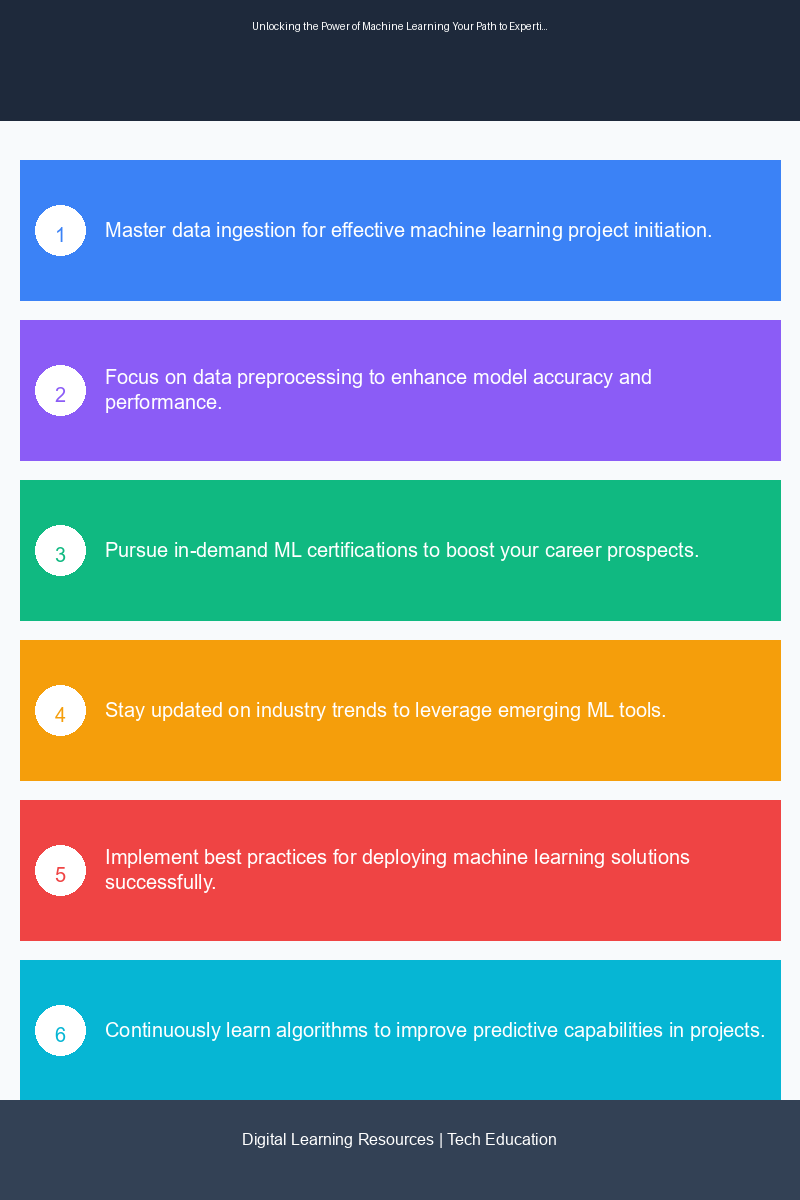As we are halfway into 2024, the landscape of technology continues to evolve at a breathtaking pace. Machine learning (ML), a pivotal branch of artificial intelligence (AI), is reshaping industries by enabling systems to learn from data autonomously. This blog post offers tech professionals and learners a comprehensive guide to the technical concepts, practical applications, and career development opportunities in machine learning. Whether you’re a seasoned developer or a newcomer, there are actionable insights for everyone.
Key Takeaways
- Understanding the crucial steps in machine learning projects, including data ingestion and model deployment.
- Learning paths to becoming an AI and ML expert, with a focus on in-demand skills and certifications.
- Insights into industry trends and the tools reshaping the business landscape.
- Best practices for implementing machine learning solutions effectively.
Technical Background and Context
Machine learning is fundamentally about creating algorithms that can learn from and make predictions based on data. This branch of AI focuses on developing statistical models that improve their performance as they are exposed to more data. Key components of machine learning include:
- Data Ingestion: The process of gathering and importing data from various sources into a usable format.
- Data Preprocessing: Cleaning and transforming raw data to prepare it for analysis, which may include normalization, handling missing values, or feature extraction.
- Algorithm Utilization: Choosing the right algorithm for the task at hand, whether it be a prebuilt option or a custom solution tailored to specific needs.
- Model Training and Validation: The iterative process of teaching a model to recognize patterns in data and validating its accuracy with separate datasets.
- Hyperparameter Tuning: Adjusting parameters that govern the learning process to optimize model performance.
- Model Deployment and Monitoring: Implementing the model in a production environment and continuously monitoring its performance to ensure it meets business needs.
Practical Applications and Use Cases
Machine learning has a wide array of applications across various sectors:
📚 Recommended Digital Learning Resources
Take your skills to the next level with these curated digital products:
AI Enhanced Resume Builder
AI Resume Builder Flask App – Complete Source Code + PDF Tutorial + HTML | Digital Download for Designers
Learn AWS: Your First Cloud Application
Learn AWS: Your First Cloud Application
📊 Key Learning Points Infographic

Visual summary of key concepts and actionable insights
Comprehensive SAT Prep: 470+ Vocabulary Words
Comprehensive SAT Prep: 470+ Vocabulary Words
Master DevOps in Practice – 50 Essential Topics for Engineers (PDF eBook)
Master DevOps in Practice – 50 Essential Topics for Engineers (PDF eBook)
The Ultimate Keyboard Shortcut Guide 49 Software Cheat Sheets in One PDF Bundle
The Ultimate Keyboard Shortcut Guide 49 Software Cheat Sheets in One PDF Bundle
- Healthcare: Predictive analytics for patient diagnosis and personalized treatment recommendations.
- Finance: Fraud detection systems that analyze transaction data in real-time to flag suspicious activity.
- Retail: Recommendation systems that analyze customer behavior to provide personalized shopping experiences.
- Manufacturing: Predictive maintenance models that forecast equipment failure, reducing downtime and costs.
- Marketing: Customer segmentation and targeting based on data-driven insights into consumer behavior.
Learning Path Recommendations
As the demand for AI and machine learning expertise continues to grow, there are numerous educational opportunities available:
- Online Courses: Platforms like Coursera, edX, and Udacity offer specialized courses on machine learning fundamentals, deep learning, and data science.
- Certifications: Certifications from recognized organizations like Google Cloud, AWS, and Microsoft can enhance your credibility and showcase your expertise.
- Hands-On Projects: Engage in practical projects through platforms like Kaggle or GitHub to build a portfolio that demonstrates your skills.
- Networking and Communities: Join forums and communities like Stack Overflow, LinkedIn groups, and local meetups to connect with fellow learners and professionals.
Industry Impact and Career Implications
The integration of machine learning into business operations is becoming increasingly critical. Organizations are leveraging ML platforms not only to drive growth but also to gain a competitive edge. As a result, professionals with machine learning skills are in high demand. Potential career paths include:
- Machine Learning Engineer
- Data Scientist
- AI Research Scientist
- Data Analyst
- Business Intelligence Developer
By mastering machine learning concepts and tools, you position yourself at the forefront of technological innovation, opening doors to exciting career opportunities.
Implementation Tips and Best Practices
When embarking on machine learning projects, consider the following best practices:
- Start with Clear Objectives: Define what problem you aim to solve and establish success metrics from the outset.
- Focus on Data Quality: Invest time in data preprocessing and ensure that the data used for training is accurate, relevant, and representative.
- Iterate on Models: Utilize iterative development for model training and validation to refine your approach continually.
- Leverage ML Platforms: Utilize comprehensive machine learning platforms like TensorFlow, PyTorch, or Scikit-learn, which provide extensive resources for model creation, management, and deployment.
- Monitor and Adjust: After deployment, continuously monitor model performance and be prepared to adjust based on real-world data feedback.
Future Trends and Skill Requirements
Looking ahead, several trends are shaping the future of machine learning:
- Ethical AI: As businesses increasingly adopt AI technologies, understanding ethical implications and biases in ML algorithms will be crucial.
- Automated Machine Learning (AutoML): Tools that simplify the machine learning process, making it accessible to non-experts, will continue to gain traction.
- Integration with IoT: Machine learning will increasingly be used alongside the Internet of Things (IoT) to analyze real-time data from connected devices.
- Specialization: The emergence of specialized platforms catering to industry-specific needs will require professionals to adapt and learn new tools.
Developing skills in data handling, algorithm selection, and model deployment will be critical for future ML practitioners.
Conclusion with Actionable Next Steps
The journey to becoming a machine learning expert in 2024 is filled with opportunities for growth and innovation. Here are some actionable steps to get started:
- Enroll in an online machine learning course to build your foundational knowledge.
- Obtain relevant certifications to validate your skills and enhance your resume.
- Engage in hands-on projects to apply your learning and build a robust portfolio.
- Stay updated on industry trends by following tech blogs, attending webinars, and participating in relevant communities.
By following these steps, you’ll be well on your way to mastering machine learning and unlocking new career opportunities in this dynamic field. Embrace the challenge and be part of the future of technology!
Disclaimer: The information in this article has been gathered from various reputed sources in the public domain. While we strive for accuracy, readers are advised to verify information independently and consult with professionals for specific technical implementations.
Ready to advance your tech career? Explore our digital learning resources including programming guides, certification prep materials, and productivity tools designed by industry experts.



